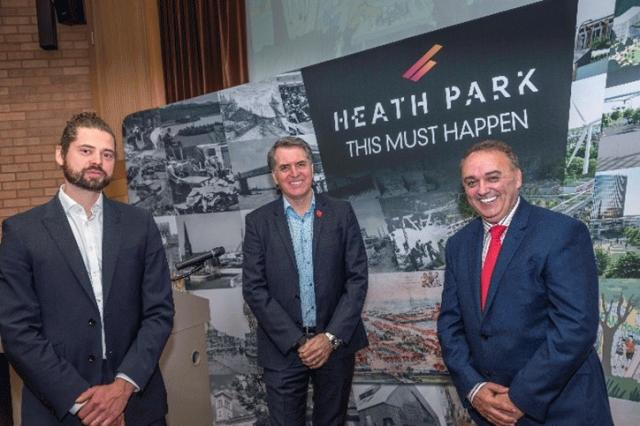'Heath Park' vertical farming model can be a climate change game-changer, says Dr Paul Myers
A world first pilot study has demonstrated that vertical farms powered by hydrogen can be a game-changer in the battle to halt climate change, according to renowned vertical farming expert Dr Paul Myers.
Vertical farming is a central feature of Heath Park, a Liverpool City Region ‘Beacon Project’, which is the vision of SOG Group, owner of The Heath Business and Technical Park, in Runcorn.
SOG has produced an innovative scheme to regenerate the location into a Net Zero Carbon community ahead of Government emission targets. Through repurposing existing buildings alongside new developments to create a Net Zero environment powered by renewable energy, SOG will develop a unique community which meets the challenges of both Climate Change and the Government’s commitment to levelling up strategy.
Heath Park is one of 35 ‘Green Innovation’ schemes in a Global Investment Atlas showcased to top international investors at last month’s Global Investment Summit in London. Heath Park is the only project from Liverpool City Region represented in the Atlas and is one of only two from the entire Northwest and Wales.
The Heath Park scheme revolves around sustainability and vertical farming. SOG commissioned a study by Liverpool-based Farm Urban, run by Dr Myers, and the University of Liverpool, which was carried out in the summer to determine if Vertical Farms could operate viably using renewable energy.
Dr Myers says: “The Food System is the largest contributor to Climate Change through Greenhouse Gas emissions, soil erosion, water use and biodiversity loss. Vertical Farming presents a solution to each of these. This has been recognised by global players such as Google Ventures, Bezos expeditions, Soft Bank, Elon and Kimbal Musk, each investing 100’s Millions of dollars in the space over the past five years. Kimbal Musk is quoted as saying ‘Urban Farming is the new internet’.
“Vertical Farming is a high-growth market valued at $2.2 bn in 2018 with Barclays predicting it is set to reach £50bn by 2030. However, there are challenges for vertical farms to overcome, the main two being energy use and a centralized distribution model.”
Dr Myers says Heath Park will overcome these challenges following the success of the pilot study by the Farm Urban and University of Liverpool team that developed a model to test a Net Zero Carbon Vertical Farm.
“The successful pilot has validated the model and is a key step towards realising our goal of Net Zero Carbon Vertical Farms. Heath Park enables us to set up a Vertical Farm with a hyper-local distribution model close to homes and businesses within the Heath Park scheme, and with partnerships with organisations such as Liverpool City Region,” says Dr Myers.
He adds: “Ours is a uniquely holistic approach. Vertical Farming is not simply about producing food at scale in peri-urban warehouses -- this has and is being done, and there is more to come. Vertical Farms can do so much more. If approached in the correct way; powered by renewables, integrated into the fabric of society for people to see, feel and taste, they can have far greater impact.”
Dr Myers says Vertical Farms can:
● Contribute to cleaner air.
● Reduce carbon locally.
● Give agricultural land back to nature - increasing biodiversity and further reducing carbon globally.
● Provide high-tech meaningful jobs.
● Provide green infrastructure.
● Improve health outcomes by giving local people access to the freshest healthiest food.
Dr Myers adds: “The Vertical Farms we are developing will deliver a financial, social and environmental return on investment. It is at the intersection of these three areas that Vertical Farms work best, and it is this holistic approach that sets The Heath Park Project out from the rest of the world.
“It’s a model that can be replicated. Heath Park is a model for cities all over the world to follow, a world leader in hydrogen power and clean energy, vertical farming and urban design. When you combine these three together you have something very powerful and never done before, a genuine world first. Imagine if we could grow healthy food locally and at the same time absorb CO2 equivalent to 21 million mature trees over ten years!”
He was speaking at a North-West Region COP26 Roadshow on Thursday, November 4th, held at The Heath Business and Technical Park and organised by the Local Energy North West Hub, alongside the five North West Local Enterprise Partnerships - Cheshire & Warrington LEP, Cumbria LEP, Greater Manchester LEP, Liverpool City Region LEP and Lancashire LEP - Liverpool City Region Combined Authority and Greater Manchester Combined Authority. Speakers included political, business and academic leaders from across the region, all active in the mission to achieve Net Zero Carbon emissions
See the Vertical Farming film:
https://vimeo.com/cdandpmedia/review/636290952/dfd64affe2
About The Heath
The Heath Business and Technical Park is a phenomenal regeneration success story. Formed in 2000, its owner and operator, SOG Ltd, has transformed a once single occupancy corporate facility into a thriving independent business park. The Heath now provides office and laboratory accommodation for more than 120 individual organisations, ranging from business services and IT specialists to those at the cutting edge of science, research and advanced manufacturing. Around 2,000 people are employed at the site. For further information, telephone 01928 515988 or visit www.theheath.com
For more information, please see:
www.theheath.com
PAUL SMITH ASSOCIATES
4th November 2021

Editors please contact PSA for high res version of this and other photos for use with this news story.
